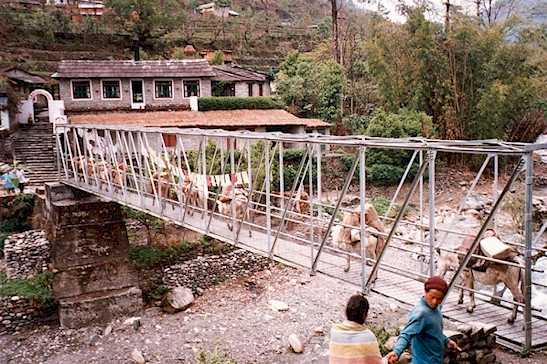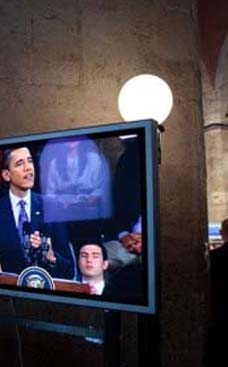
For example, as a Peace Corps volunteer in Nepal long ago, I hired a cook who had no formal education but was spectacularly intelligent and resourceful. Beyond preparing excellent meals, he could butcher a goat, thatch a roof, plaster walls, resole shoes and fix broken alarm clocks. He was also an able tinsmith and a skilled carpenter. Yet his total lifetime earnings were less than even a very lazy, untalented American might earn in a single year. Well-paid Americans owe an enormous, if rarely acknowledged, debt to the social investments that supported their success.
Nepal RPCV Robert H. Frank writes: Contrary to what many parents tell their children, talent and hard work are neither necessary nor sufficient for economic success
Before Tea, Thank Your Lucky Stars
By ROBERT H. FRANK
Published: April 25, 2009
THE link between success and luck is stronger than many people think.
Analysis of this connection provides a useful framework for weighing the issues raised around the country at recent “tea parties,” where orators in high dudgeon bemoaned their “crippling” tax burdens. Responding to President Obama’s plan to let the Bush tax cuts for top earners expire in 2010, one protester’s placard read, “Spread your own damn wealth around!”
Other protesters contended that the tax system already strains the vital connection between individual effort and reward and warned that further tax increases might destroy it.
But these accusations don’t withstand scrutiny. The current system is much fairer than many people believe, and the president’s proposal will make it both fairer and more efficient.
Contrary to what many parents tell their children, talent and hard work are neither necessary nor sufficient for economic success. It helps to be talented and hard-working, of course, yet some people enjoy spectacular success despite having neither attribute. (Lip-synching members of boy bands? Money managers who bet clients’ retirement savings on subprime-mortgage-backed securities?)
Far more numerous are talented people who work very hard, only to achieve modest earnings. There are hundreds of them for every skilled, perseverant person who strikes it rich — disparities that often stem from random events.
In his current best seller, “Outliers,” Malcolm Gladwell reports that a disproportionate number of pro hockey players owe their success to the accident of having been born in January, which made them the oldest, most experienced players in every youth league growing up. For that reason alone, they were more likely to make all-star teams, receive special coaching and eventually become professionals.
Although people are often quick to ascribe their own success to skill and hard work, even those qualities entail heavy elements of luck. Debate continues about the degree to which personal traits are attributable to environmental and genetic factors. But whatever the true weights of each, these factors in combination explain nearly everything. People born with good genes and raised in nurturing families can claim little moral credit for their talent and industriousness. They were just lucky. And they are vastly more likely to succeed than people born without talent and raised in unsupportive environments.
Even in markets where luck plays no role, minuscule differences in performance often translate into enormous differences in salaries. In music, even sophisticated listeners have trouble detecting differences between the handful of best cellists in the world and those in the next tier. But recording companies need only a few cellists. And if there is a discernible difference, however small, between the two groups, the best will land lucrative recording contracts while those just below them may struggle to make ends meet on an orchestra player’s salary.
As economists have only begun to realize, pay differences often vastly overstate differences in performance — not only in traditional winner-take-all labor markets like entertainment and sports, but also in more conventional arenas. In law, consulting, investment banking, corporate management and a host of other occupations, the ablest performers are often paid hundreds or even thousands of times as much as others who perform nearly as well.
Another important message of recent research is that a person’s salary depends far more on where she is born than on her talent and effort.
For example, as a Peace Corps volunteer in Nepal long ago, I hired a cook who had no formal education but was spectacularly intelligent and resourceful. Beyond preparing excellent meals, he could butcher a goat, thatch a roof, plaster walls, resole shoes and fix broken alarm clocks. He was also an able tinsmith and a skilled carpenter. Yet his total lifetime earnings were less than even a very lazy, untalented American might earn in a single year. Well-paid Americans owe an enormous, if rarely acknowledged, debt to the social investments that supported their success.
The president’s proposal is modest: raising the top marginal tax rate from 35 percent to 39.5 percent, its level when Bill Clinton left office and well below the corresponding level in most other industrial countries. There has never been a shortage of talented people willing to work hard for success — even in countries with top rates much higher than 50 percent. And the president’s proposal would not cause such a shortage in 2010.
It would, however, promote more efficient provision of public services, in much the same way that contingent fee contracts often promote more efficient provision of services in the private sector. For example, when lawyers are willing to waive fees unless their client wins, wrongfully injured accident victims often gain legal representation they couldn’t otherwise afford. Similarly, when government levies higher tax rates on the wealthy, we can provide public services that the wealthy and others greatly value but that would otherwise be beyond reach. Under such a tax system, the heavier tax bill becomes payable only if we’re lucky enough to end up among life’s biggest winners.
Financially successful tax protesters seem blissfully unaware of how incredibly fortunate they are. To borrow from the late Ann Richards and her description of the first President Bush, they were born on third base and thought they’d hit a triple.
Robert H. Frank, a Cornell University economist, is a visiting faculty member at the Stern School of Business at New York University.











